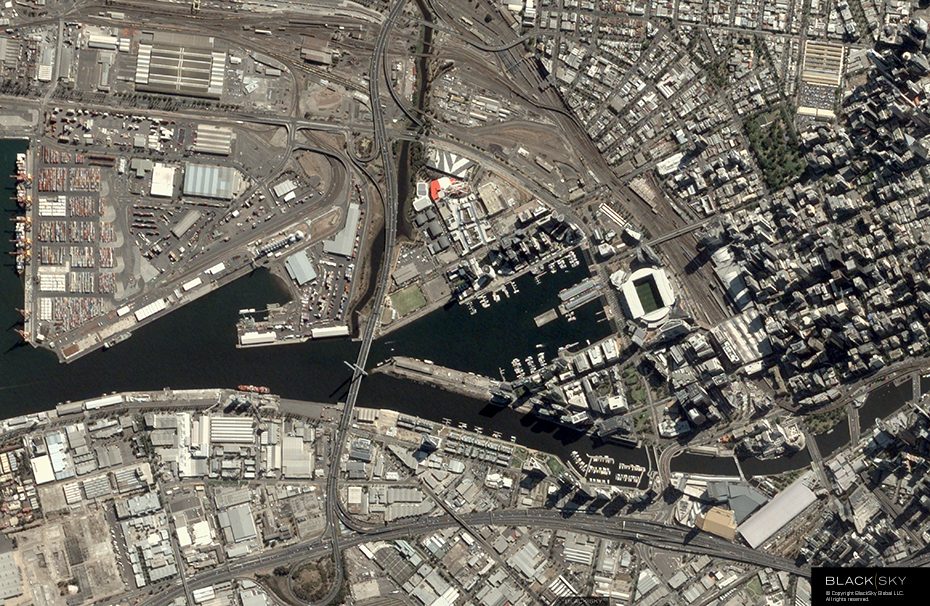NRO Taps Start-Ups, Eager To Probe Commercial Tech
Posted on

BlackSky Global satellite imagery of Melbourne, Australia
GEOINT 2019: Fearful of falling behind commercial satellite providers, the National Reconnaissance Office (NRO) is kicking off an effort to seek out new commercial providers of satellite imagery technologies to improve data collection and dissemination to the military and to the Intelligence Community, says Troy Meink, director of GEOINT for NRO.
“To be quite honest most of our space systems are not the leading edge technologies,” Meink explained here yesterday. “We’ve not kept up in many cases with the commercial environment.”
On top of that, the NRO, best known as the builder and operator of America’s highly classified satellites, is looking to commercial providers simply because the “demand signal” for imagery is rapidly increasing.
Meinke yesterday announced yesterday ‘study contracts’ with BlackSky Global and Planet, two commercial Earth observation start-ups that are new to NRO. Maxar Technologies, which already is under NRO contract under its DigitalGlobe unit, also was awarded a contract designed to allow NRO to look at some of its new capabilities.
He added that NRO expects within the next six to 12 months to issue requests for information (RFIs) aimed at start-ups with unproven technologies that might in future help enhance NRO’s capabilities. For now, Meink said, the NRO, as a matter of policy, is contracting only with US firms.
Meink told the packed late-afternoon session here in San Antonio that he is “very excited” about working in the “very dynamic” commercial marketplace, explaining that NRO is moving towards “expanding the number of contractors we’re working with, and the different products we are trying to get from the commercial market.”
Industry sources here said the new contracts (no dollar value or duration was announced) set up both BlackSky and Planet to potentially compete for the pot of NRO funds now sitting in options to continue its access to imagery from Maxar, the new corporate parent of long-time NRO imagery provider DigitalGlobe, through 2023 under the EnhancedView program.
NRO took over the job of procuring commercial satellite imagery for DoD and IC uses from the National Geospatial-Intelligence Agency (NGA) in 2017, and responsibility for the EnhancedView Follow-On contract in August 2018 that extended the long-running relationship with DigitalGlobe as the major supplier. That contract secured a year’s worth of access to the the company’s World View and Geoeye satellites, and included an option for another year (a total value of $600 million.) Maxar in November 2018 won a contract extension that added a potential $300 million to the deal, via options for NRO to access data from its new WorldView Legion constellation (set to begin launching in 2021) and through 2023.
Industry officials explain that the NRO ‘study contracts’ are designed to assess whether the current capabilities offered by Planet and BlackSky can meet NRO requirements, as well as whether their future capabilities can help NRO achieve its mission goal of providing imagery products with higher revisit rates (known as ‘persistent overhead’). Depending on the outcome of those studies, either or both companies could be chosen as alternative, or more likely companion, providers to Maxar — something that would catapult their status and help cement their future viability.
The NRO press release about the awards stated: “The NRO will use these study contracts to assess the performance capabilities of these domestic commercial satellite imagery providers and validate their ability to satisfy U.S. government requirements into the 2023 timeframe. The results will help inform the next generation of NRO’s commercial imagery procurements, expected to commence in late 2020.”
Scott Herman, chief technology officer at BlackSky, told me that the company is “very excited” about getting a nod from NRO, and explained that NRO is looking at the company’s planned constellation of 60 small satellites as a source of imagery.
“We’re combining high-revisit satellite imaging with a unique analytic solution for site monitoring, all at a price point not seen before with traditional providers. We look forward to building a long-term partnership with the NRO and continuing our support of the U.S. government’s existing and emerging security and intelligence needs,” said Brian O’Toole, CEO of BlackSky, in a statement.
Two of the company’s satellites — Global 1 and 2 — are on orbit, and BlackSky officially began providing commercial imagery in May. The company’s products, however, are not limited to imagery. They also provide analytics that “combine access to high-quality satellite images from multiple sources with a diverse set of real-time sensor data such as social media, news and other data feeds,” according to the press release. That illustrates the rapid pace of technology development. In the past, only NRO and NGA, supplemented by NSA, could crunch that much data at speed to get useful geospatial imagery to the point of the spear.
The NRO contract with Planet is via the company’s subsidiary Planet Federal, set up specifically to sell to US government clients. Planet currently operates the world’s largest commercial imagery constellation, with 140 satellites currently on orbit.
“The NRO is examining how it can expand a partnership with the commercial remote sensing industry in 2020, so it’s looking into new capabilities and keeping an eye on future developments,” says Rich Leshner, Planet Federal’s executive vice president of operations, in a statement. “Planet is constantly iterating and improving, so it’s great that they’re willing to explore these new capabilities with our data and tools.”
NRO’s efforts come as the Trump Administration is attempting to find ways to bolster the US commercial satellite industry, including through streamlining licensing regulations managed by the Department of Commerce.
Subscribe to our newsletter
Promotions, new products and sales. Directly to your inbox.
